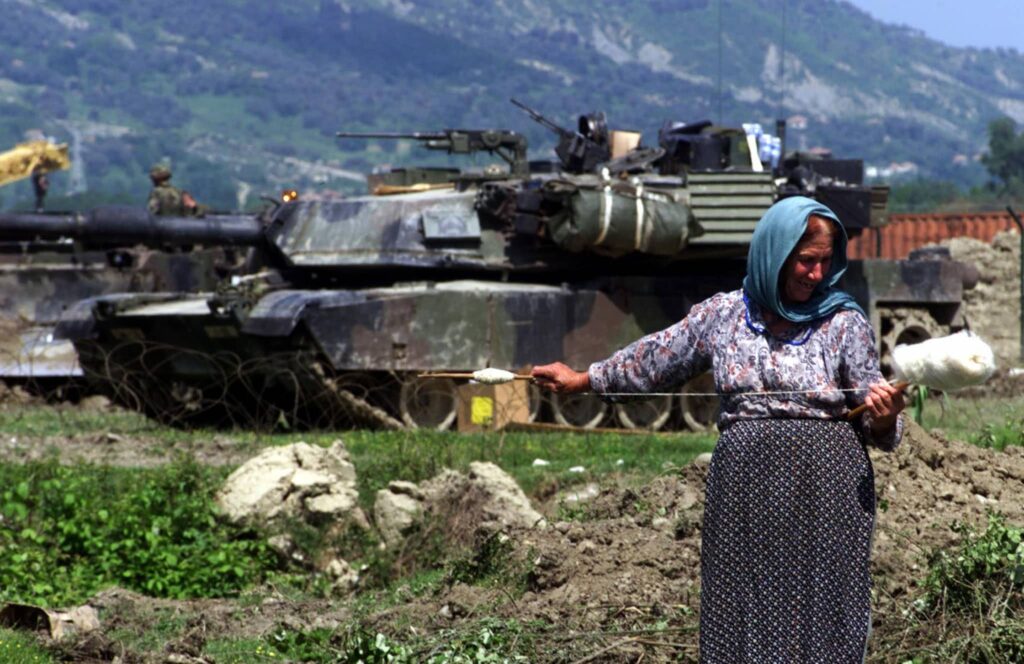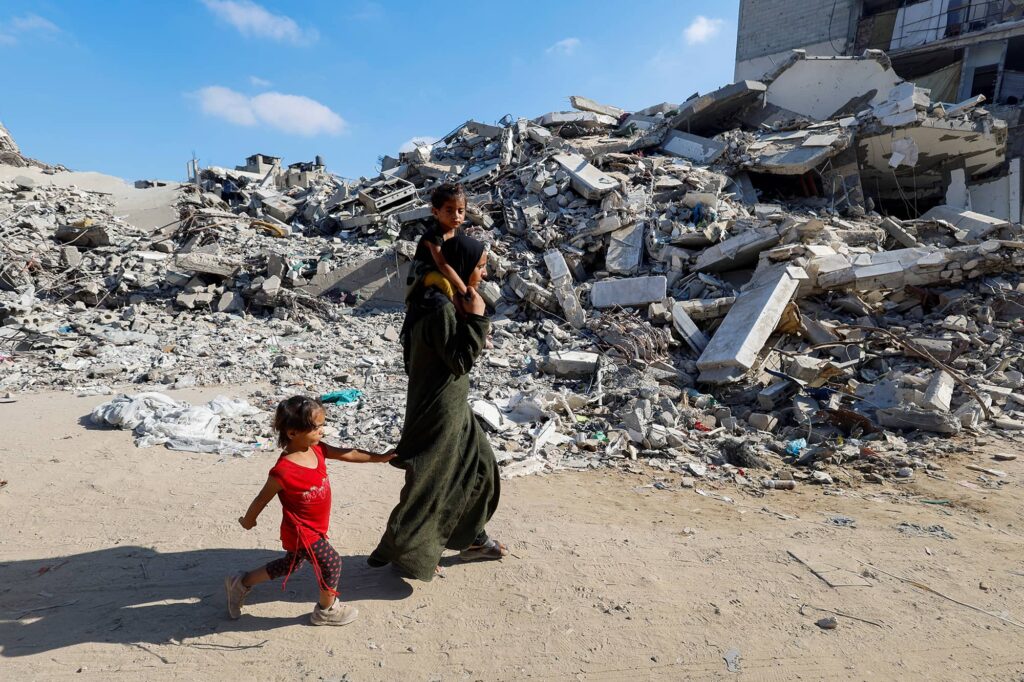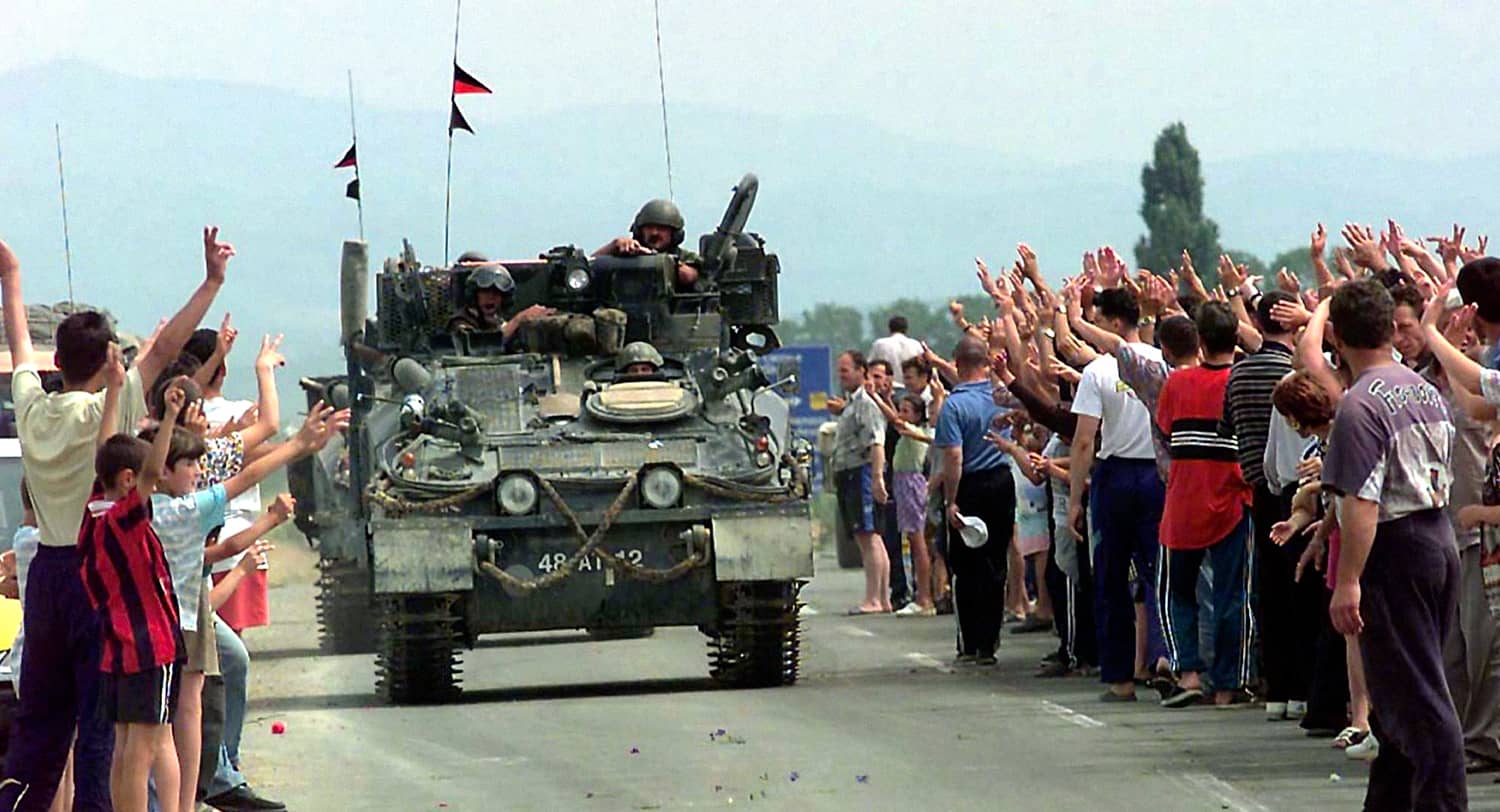As the war in Gaza drags on, so do efforts to identify a model for postwar governance and security. The experience of Kosovo following NATO’s 1999 expulsion of Serbian forces may offer some lessons.
A Brief History Refresher
In March 1999, in the wake of a growing Kosovo Liberation Army insurgency, an upturn in Serbian repression of the ethnic Albanian majority in Kosovo, and a failed effort at a diplomatic solution, NATO launched a bombing campaign to induce the withdrawal of Serbian forces. In June, Belgrade withdrew its forces. A Military-Technical Agreement between NATO and Belgrade, along with UN Security Council Resolution 1244, established a NATO-led peacekeeping force and an interim UN mission.
In 2008, Kosovo declared independence with the support of the United States and most EU and NATO member states, and the UN mission handed over administrative authority to an elected Kosovo government. Serbia, Russia, China, and some EU members (Spain, Greece, Cyprus, Romania, Slovakia) refused at the time, and still refuse, to recognize Kosovo’s independence. Serbia’s constitution declares Kosovo “an integral part of the territory of Serbia.”
Today, EU- and US-led efforts to broker normalization continue, with the foreigners frequently appearing more interested in a deal than the governments in Belgrade and Pristina. NATO troops remain in place to deter violence between Kosovo’s Albanian majority and Serb minority and to discourage Belgrade from sending forces into Kosovo to protect the latter, as it periodically (if ritualistically) threatens.
Like Gaza today, Postwar Kosovo Wasn’t Ready for Self-Governance
By the time of the Serbian withdrawal in 1999, Kosovo had suffered considerable human, physical and economic damage (although less than in Gaza), and perhaps 20% of the population had become refugees in neighboring countries. As Kosovo’s residents straggled back, international stakeholders concluded that however its political status was to be ultimately resolved, Kosovo could not reasonably be expected to set itself on the road to reconstruction and self-administration without foreign assistance. At its peak, thousands of UN administrators and police ran everything from economic development to traffic policing.
When the UN mission was established in 1999, independence from Serbia was far from clear. Indeed, Security Council Resolution 1244 states that “an agreed number of Yugoslav and Serb military and police personnel will be permitted to return to Kosovo” at an unspecified date. Within two years, however, momentum for independence was unstoppable, with the US a key proponent. As time went on, Kosovars increasingly chafed at being administered by foreigners. In 2001, the UN decreed a Constitutional Framework for Provisional Self-Government which led to the establishment of a Kosovo presidency and other institutions even while the UN mission retained authority.
Over time, Kosovo evolved into a functional multi-party democracy, although one that remains heavily dependent on foreign economic assistance and diaspora remittances. After independence in 2008, the UN mission contracted in size but has not gone away. The UN Security Council has been unable to agree on its fate, in light of the opposition by Serbia, Russia, and others to Kosovo independence. UNMIK today is a monitoring agency with little influence, derided when not ignored by Kosovars. .
An international governance body in Gaza could learn from the UN mission in Kosovo’s reasonably smooth transition to local control. How long before Gazans chafe at trading one set of “occupiers” for another, in the absence of an agreed path (either timeline or conditions-based) back to local autonomy, if not independence?

But NATO Faced a Comparatively Benign Security Environment
Kosovo’s Albanian majority welcomed NATO troops as liberators, and Kosovo’s minority Serb community – those who chose to stay – generally saw the NATO presence as protection from the Albanian majority. An important difference between Kosovo and Gaza is that NATO has allowed Belgrade no role in security in Kosovo, and the modest Kosovo Security Force (which evolved from the demobilized Kosovo Liberation Army) does not pose a cross-border threat to Serbia.
NATO’s strength is down from its original 50,000 troops to about 4,500, predominantly European with an American component built around several hundred National Guard troops. (I served as a political officer at the US Office in Pristina – the forerunner of the US embassy where I was later Ambassador – in 2003, just after the Guard replaced active duty forces in Kosovo. The older, calmer Guard troops seemed better suited to the peacekeeping mission in this low-threat environment.)
NATO was not meant to be the primary policing authority, and after independence, a Kosovo national police force and justice ministry took over from UNMIK in providing security in most of the country. Residents of four predominantly Serb municipalities established parallel police and courts. From 2013 to 2022 these were integrated into national institutions, but that ended (for now, at least) with a downturn in Pristina-Belgrade relations.
The 200+ NATO troops who have died in Kosovo in a quarter century have been lost in traffic accidents and non-combat incidents, a price governments seem to find acceptable even as they mourn the fallen. But NATO can be a magnet for violence. In September 2023, Serb demonstrators confronting Kosovar police turned their anger on KFOR troops, injuring dozens. People in both communities complain that NATO and KFOR are too solicitous of the other community and slow to come off the bench when violence flares – as in the case of anti-Serb rioting in 2004 and a firefight between Kosovo police and Serb gunmen in 2023.
In this unpredictable environment, few Kosovo citizens – Albanian, Serbs or members of smaller minority groups – would like to see either NATO or the small EU police force withdrawn prior to a comprehensive peace agreement.
An International Security Force in Gaza Would Face Greater Challenges
Stakeholders and observers agree that, in the short term, there is no viable way to stand up a Gazan police force both capable of maintaining order and that Israelis will trust.
There are no Israeli civilians in Gaza to equate to the existence of Kosovo’s Serb minority and thus, unlike Serbia, Israel need not worry about protecting an ethnic minority across the border. But Israel will focus on preventing any repetition of October 7 and will insist on having a cross-border security role in Gaza, in order to prevent the territory from serving once again as a base for attacks into Israel.
The alternative to a continued Israeli presence inside Gaza would thus appear to be an international peacekeeping force – perhaps with both military and police components, as in Kosovo – with the muscle, capability, and freedom via robust rules of engagement to tamp down any terrorist threat. That’s a tall order, especially since such a force would also have its work cut out winning the support of Gaza civilians. The absence of a clear endgame would also seem likely to discourage some potential participants.
What international force – whether led by the UN, the Arab League, NATO, or some other entity – would have the capability and authority needed to ensure that no armed Palestinian groups – whether elements of Hamas, Palestinian Islamic Jihad, or others – engaged in cross-border attacks, or targeted the peacekeeping force itself? One plan calls for the US to organize and lead a hybrid international force, noting that “the United States has far more experience organizing the kind of military structure that will be required for Gaza, having done similar missions in Bosnia, Kosovo, Iraq, and Afghanistan.”
A salient question is how Palestinians might view American peacekeepers, given American support for Israel? Perhaps cognizant of this sensitivity as well as the likely domestic political impact of American casualties, the plan’s authors suggest that the United States “provide a number of vital enabling capabilities and ‘back office’ military personnel, although there should be no large-scale U.S. ground troop presence in the [multinational] policing force.”

To turn this back to Kosovo – for many years the conventional wisdom was that if the Americans were to pull out of the NATO force, other allies would make for the exits. But recent iterations of the annual NATO exercise in Kosovo, through which members ante up troop contributions, suggest allies would be willing to stay the course rather than pull the plug, as long as the Kosovo-Serbia issue remains unresolved. All bets would be off, however, were the situation in Kosovo to deteriorate to the point where NATO found itself suffering combat losses.
This sort of open-ended commitment cannot be taken for granted, either in Kosovo or in Gaza. Without an exit strategy for the international force, will Gazans come increasingly to target peacekeepers, seeing them as Israeli surrogates? How many American or other peacekeepers would have to become casualties before their governments got cold feet? Would terrorists attack contributing nations at home, in an effort reminiscent of (successful) efforts to intimidate some European participants in the U.S.-led occupation of Iraq?
Conclusion – Peace and Reconciliation Will Require Bold Action
The story of Kosovo and Serbia, like that of Gaza and Israel, is one of competing narratives and parallel grievances. The two main lessons for Gaza from Kosovo are, first, the utility of an international governance and security mission that is transitional in nature and, second, the need for that mission to go in with an exit strategy.
With a quarter century of relative peace between Belgrade and Pristina, comprehensive normalization remains elusive. Neither nation feels a compelling need to work through their distrust to achieve peace, justice, and prosperity. In Kosovo, a few civil society groups are dedicated to working across communal boundaries to seek reconciliation, but theirs is not the predominant view. Thus far the EU, key European capitals, and both Democrats and Republicans in Washington have remained committed to supporting Pristina and Belgrade along the path to peace, but neither resources nor patience is inexhaustible.
If Serbs and Kosovars seem complacent as they follow a slow, incremental process of negotiations, perhaps after October 7 and its aftermath a greater sense of urgency will take hold among Israelis and Gazans ready to earnestly begin to negotiate a way forward to live as neighbors. An opportunity to break with the past exists, but will not remain indefinitely.

